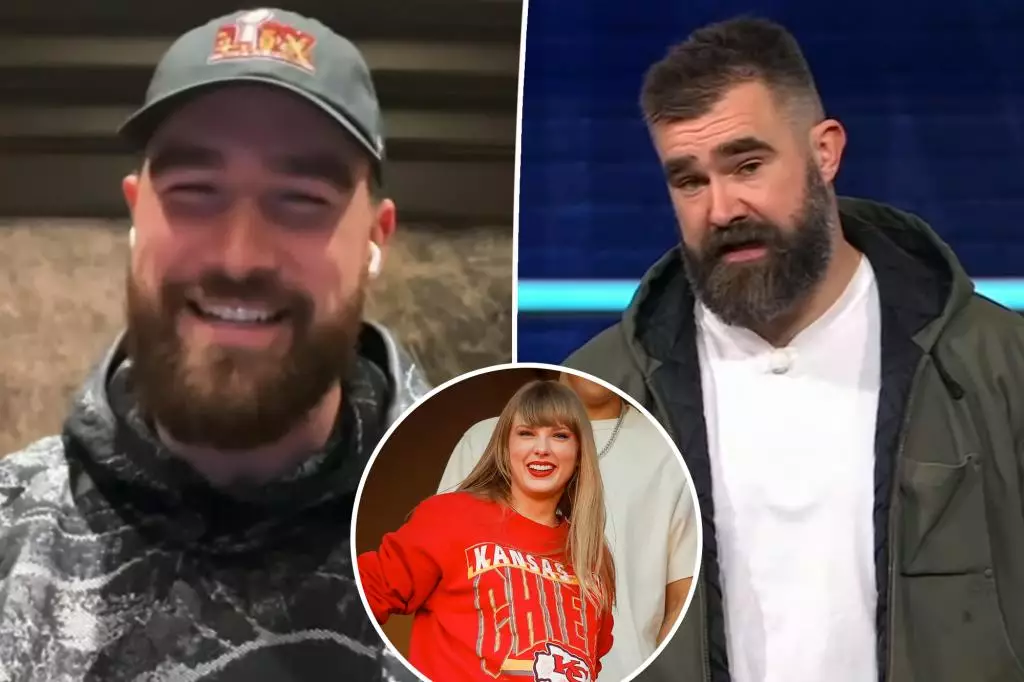In recent weeks, the NFL playoff season has witnessed an absurd wave of conspiracy theories, particularly aimed at the Kansas City Chiefs and their surprising relationship with pop icon Taylor Swift. Fans have begun to claim that the NFL is manipulating outcomes to ensure that Swift attends the Super Bowl, thereby boosting viewership with her ubiquitous celebrity. This claim has prompted various personalities, including NFL players and media commentators, to react, leading to a fascinating blend of humor and skepticism that revolves around sports, celebrity, and potential biases.
Brothers Travis and Jason Kelce have taken center stage in this debate, utilizing their platform to humorously poke fun at the claims of an agenda in the NFL. During an entertaining segment where Jason invited Travis onto his show “They Call It Late Night,” the two openly laughed about the wild conspiracy theories that suggest the league might be rigging games for increased ratings. Travis even mentioned how he would have attended a key AFC championship game if his team, the Chiefs, had lost to the Buffalo Bills – a jest that cleverly became an opportunity to criticize the Bills’ quarterback, Josh Allen.
With a mix of jest and genuine admiration, Travis defended Allen’s skills, even as Jason turned the conversation back to the theories swirling around them. By shifting the spotlight from the performance of players to the accountability of officials, Jason highlighted the absurdity of blaming individuals rather than examining the game itself. Their playful banter embodied a much-needed dose of normalcy in the midst of chaotic public discourse surrounding the games.
The involvement of Taylor Swift is unarguably at the heart of this swirling narrative. Swift’s relationship with Travis Kelce has led to heightened attention on the NFL, and especially on Chiefs games. Some commentators have suggested that her presence contributes significantly to viewership numbers, thereby leading to speculation that the league may have a vested interest in promoting her appearances—for instance, ensuring the Chiefs reach the Super Bowl spectacle.
Notably, media figure Skip Bayless has publicly stated that Swift’s attendance could lead to millions lost in viewership if she were absent. He insinuated that the NFL must safeguard its stars, like Patrick Mahomes, suggesting that referees would intervene in favor of the Chiefs to keep the spotlight on Swift. Such claims, while delivered in a tongue-in-cheek manner, underscore the complex relationship between celebrity culture and sports entertainment.
As the narrative evolves, so does public reaction. The “Swift Effect,” as it has been dubbed, captures the fascination of fans who are invested not only in the game but also in the lives of its players, particularly their ties to high-profile figures like Swift. Some enthusiasts have taken to social media to express their discontent with perceived biases in the playoffs, indicating that the conspiracy theories are resonating at a profound level.
However, the absurdity of these theories is acknowledged even by those within the league. Former NFL VP Dan Brandino has expressed exasperation over claims that the league is rigged for celebrity influence, stating that he too has heard such talk from family members. His comments signal a desire to maintain the integrity of professional football amidst rising sensationalism.
The interplay of humor and serious discourse found in the remarks of Travis and Jason Kelce serves to deflate the ballooning speculation surrounding NFL playoffs and celebrity influence. The theories claiming that Taylor Swift’s involvement somehow alters the trajectory of professional football, while entertaining, reflect a broader trend of conflating celebrity culture with sports entertainment.
Ultimately, while the connection may generate headlines and increase engagement, it is the authentic competition on the field that resonates most with fans. As the playoffs unfold, it is essential to differentiate between the theatrics and the heart of the game, the latter of which remains untainted by external influences, regardless of how much the media tries to spin a narrative. The venture into this complex relationship between sports and celebrity will inevitably continue, keeping fans engaged and entertained far beyond the final whistle.
